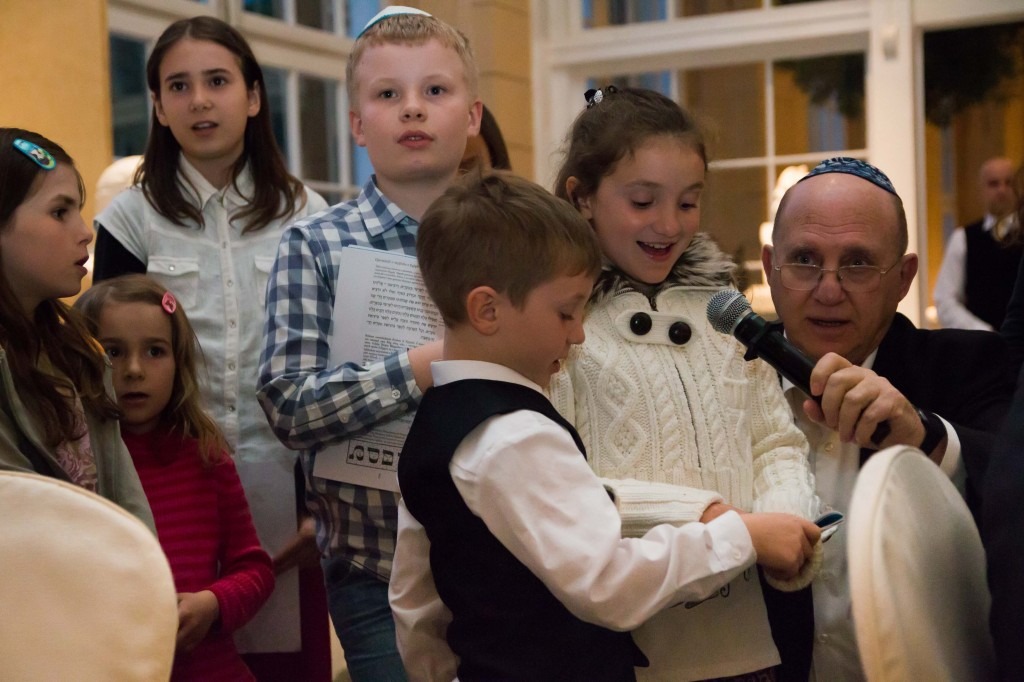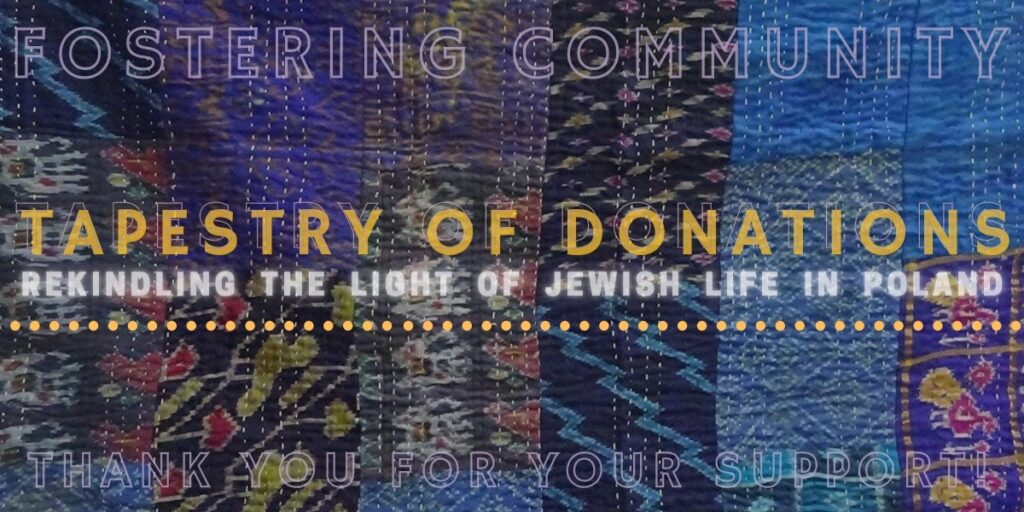Reflections on Jane Eisner’s Visit to Poland – Perceptions and Misperceptions
 |
Dear Jane,
You have been to Poland through the Forum but not seen or met Polish Jews.
The Forum addresses Poles and American Jewish visitors. It seems to have an allergy to Polish Jewish life. Lets say it favors certain groups and elides (suppresses) others. Many of the questions you ask can only be answered by meeting Jews who are genuinely part of the Jewish renewal movement. You met only a select few. Most of those folks seemed to correspond with the people who are somehow favored. It is sad that you were not introduced to people from the Progressive Jewish community, Beit Polska.
A Brief History of Progressive Judaism in Poland
We are the continuation of the Jewish community that was founded in 1803 in Warsaw, spread throughout Polish lands and grew by 1939 to be 10% of Poland’s Jews. We are called Progressive (postembowy) throughout the 19th and 20th Century. Today Friends of Jewish Renewal in Poland, the European Union for Progressive Judaism, and World Union for Progressive Judaism are the sponsors of Beit Polska. (A number of colleagues form Beit Polska are writing a book about this overlooked part of non-Orthodox Judaism’s life in Poland with a professor Michal Galas from Jagiellonian University. Professor Galas has just published in English a history of 19th Century Dr. Rabbi Marcus Jastrow, a Polish patriot and leader of Philadelphia’s Reform and Conservative movements. Jastrow is the author of a famous Rabbinic dictionary.)
Let me assure you that there is a Jewish community revival in Poland. It is bolstered and indeed fostered by the many non-Jewish Poles who are studying in Jewish studies programs, helping in the development of the museum, learning about their local Jewish community, cleaning cemeteries (Read: Louise Steinmen’s The Crooked Mirror: A Polish-Jewish Dialogue; here is a review of the book).
The admittedly small group of Jews involved in living Jewish lives are not on the Forum’s circuit. The Forum’s good work is supposed to address a young generation of Poles who are unfamiliar with the history of Jews in Poland. The question of how many people might “come out of the closet” is a good one. We don’t have an answer yet. The stories about how people came to know about being Jewish and their experience searching for acceptance by the Jewish community is inspirational and painful. Many times people are not encouraged and welcomed when they seek to connect to Judaism. Beit Polska and its nine communities provide welcome and education.
Self – inflicted wounds
I have been a part of the effort to build Jewish life for the last five years. That effort faces many difficulties and many of those difficulties are the self inflicted wounds by Polish Jews. It is clear to me that the decency and probity necessary to attract people to Judaism is dependent on a thorough public audit of the activities of the pseudo-Orthodox Jewish community. The organized Jewish world outside of Poland screams anti-semitism when the call for an audit of the millions of dollars received from the sale of pre-World War II Jewish communal property is made. Beit Polska has just won a long protracted battle in the Polish Supreme Administrative Court because the pseudo-Orthodox community did not want to allow religious freedom entailing a separate Progressive Jewish community. The pseudo-Orthodox community spent tens of thousands of dollars and forced us to spend — far less — but it cost us money. (Even their rabbis are rumored to been against the suit but chose to remain silent.)
I am sorry that you didn’t get to Beit Warszawa or its eight sister communities. I assume that perhaps Hildah (pictured in your article) shared some of what she saw on the October 31 visit to our community. (That was an evening where we were at relatively lower numbers (40) because of the four-day weekend but strong and inspiring nevertheless. Polish Progressive Jews are like American Progressive Jews only more so, they are part of the Polish culture.)
Please spend some time with our web sites, especially RabbiBeliakBlog and PolishJewsReviving.org and our facebook page. Note that the story of Polish Jewish life has many chapters.
The development of Polish Jewish life is a disruptive narrative to Israel and to the Diaspora. The recent opening of Polin: The Museum of Polish Jewish History restores to Jews everywhere but especially in Poland our past. (Dr. Barbara Kirschenblatt-Gimblett and the army of committed individuals and groups associated with this project have raised the bar for museums, perseverance, and determination.)
The JCC in Krakow is a great success but the one in Warsaw requires too many steps. We are glad for the JCC efforts through out Poland. We wish there were more JCC’s in other cities in Poland that follow the Krakow model. Krakow’s JCC under the leadership of Jonathan Ornstein is the best Jewish institution in Poland and they have an elevator! The lack of an elevator in the Warsaw JCC makes it less accessible.
I am not offended by non-Jews who are part of the revival. I welcome them but as you correctly say they are a challenge to the indifference of many Jews. Just the opposite is true in Poland, where many non-Jews actually contribute a great deal, even the lion’s share of the effort. Their interest gives credence to the 100,000 to 200,000 people with at least one Jewish grandparent who are in the closet to come out!
Here are a few quotes from your article and some quick of responses:
1. “Who gets to carry forth Jewish culture, anyway? And if we do cede that task to these dedicated outsiders, for whom this is an intellectual pursuit and a personal cause, but not a religious or a tribal obligation, can the culture be sustained?”
If there will be no Jewishly educated Jews in Poland then the answer to your question is obvious. I think it vital that Jews be an organic community in Poland. In any case, about twenty-five per cent of the people who regularize their Jewish status with Beit Polska decide to leave Poland, mostly for Israel. (This too is a success for us because among many things it means that they want more Jewish life.) It may happen again that anti-semitism will rear its head — who can know for sure — then let the world know that these Jews who want to be Jews will be informed of their heritage enough to make choices. If anti-semitism does rear its ugly head then let the Poles who seek a Poland with no Jews be confronted by other Poles who are informed defenders of Jews and Judaism. In Poland, we may one day see a situation where the parallel to the Anti-Defamation League — which doesn’t yet exist — is led by Jewish and non-Jewish Poles! Those of us living in North America cannot give up on the idea of a civic society in America. Nor can Israel give up on its civic society just because the ideals of Zionism are betrayed by the “Nation state bill” and neither can the Poles. The struggles for a civic society in these three countries are ultimately tied one to another.
2. “Poland has yet to conduct the sort of therapy forced upon the Germans. There were no Nuremberg-style trials here. The atrocities committed by Poles against the Jews, including pogroms after World War II, were left unpunished. To publicly acknowledge what happened to the Jews diminishes the Poles’ own sense of victimhood.”
Poles are indeed struggling to untangle their history. This struggle deserves to be understood and appreciated by the world. The best source for understanding the struggle over “memory” is the essay “The Memory of the Holocaust in Post-1989 Poland: Renewal – Its Accomplishments and Its Powerlessness” by Joanna Beata Michlic and Malgorzata Melchior’s essay in Bringing The Dark Past To Light: The Reception of the Holocaust in Postcommunist Europe. Poles are reluctant – aren’t we all — but Poles do not need to be forced. Constant hectoring of the protagonists undermines the parties seeking to foster a very delicate conversation.
One needs to note the public discussions around Gross’ books (also here) and appreciate that the conversation is happening. Note also the films Aftermath and Ida. In January an important documentary film, Bodgan’s Journey will offer another important venue for discussion. This important film speaks volumes about Poles struggling to face their past. Beit Polska is proud to be a co-producer of this documentary that address the July 4, 1946 massacre of Holocaust survivors murdered by Poles.
It is clear that Poland was a victim during World War II and the lack of understanding of the particulars does not contribute to building understanding. Poland is far into its “therapy” in many quarters and now, it is time for Jews to go into their own therapy. Let’s remember that therapy takes time and is not always successful with everyone.
3. “As in so much of Poland, persecution of Jews didn’t begin with the Nazis.”
The German Nazis killed six million Jewish people and at least three million Christian Poles. Polish anti-semitism and war-time greed led some Poles to do terrible things during the war. My mother and most survivors were wounded by the lack of solidarity that was displayed but they also told of Poles doing impossible things to aid them. The betrayal was great but the sense of gratitude to those that helped was even greater. How do we tell both stories? Poland is one of the few places where if a Pole was found helping/hiding Jew the death penalty was administered on the spot. Yad VeShem records the largest group of righteous gentiles comes from Poland.
My question is not why were there not more Poles that helped but why were there any? After years of self – examination, I am convinced that if I were a Pole I would not help and thus endanger my family. (I am sorry about this personal revelation.)
The habits of hate and greed were fed in the post-war situation by what happened in Poland to Poles and Jews during the war. After World War II there was a civil war in Poland from 1944 to 1948. Communist authorities used anti-semitism to cover up the disappointments and failures of the communist system. Painfully ironic, is the charge by many Gentile Poles that Jews benefited from the Communist regime. But does someone seek to refute these? In a civic society explaining the misperceptions and standing ones ground is what one must do. Polish Jews will hopefully be a part of a civic society that will develop in Poland. There are plenty of people in America who resent the notion of a civic society but I don’t see too many of America’s diverse population looking for the exit signs. Our struggle in Poland may be different but at this moment there is much to hold on to.
Consequences of Mourning too Much
My work with Beit Polska is to seek resources to foster Progressive Jewish life. My fund raising experience is that some people (donors) are offended to hear about Jewish life flourishing in Poland. The broad Jewish community is too caught up with continuous mourning for Poland’s lost Jewish community; amid the mourning there is a disdain and even hate for anything attached to the name, Poland. There is a hard core of misinformation that is part of the general Jewish community’s general narrative. Jane, you pointed to some of that in your article. An additional area of needed improvement. is the re-thinking of March of the Living program. Jewish groups have been coming to Poland to visit the sites of the German destruction of our people and focusing our grief and loss on the Poles. This horrible mistake is only too slowly being addressed.
Rescue
When I first came to Poland a man met me in my office for a conversation. He was about four years older than me. He informed me that he just found out from the last relative in her 90s that he would not inherit the farm because he is a Jew. He didn’t know what to that meant. He had been raised a Catholic and that is all he knew. The man visited the Orthodox institution. They demanded that he bring papers proving he is a Jew. How ridiculous! Beit Polska’s policy is to welcome him and invite him. He is our long lost brother and we have an obligation to welcome him. We have other obligations to the brave Poles that we dare not forget. Our world of obligation extends to the family that risked everything to take in a Jewish baby. (The Polish village that surely knew but didn’t turn their neighbors in.) We have an obligation to the desperate Jewish mother – now long dead – who gave up the child hoping that it might be rescued.
Our working with the emerging Jewish community in Poland is an opportunity to rescue Jews and to open a new chapter in our relations with our past and our future.
Jane, warm regards and thanks for writing this article. Please come visit us.
Haim


Leave a Reply